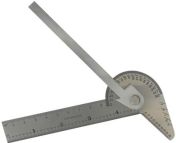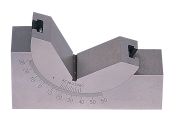Angle Gauges
A surface plate is a solid, flat plate used as the main horizontal reference plane for precision inspection, marking out and tooling setup. The surface plate is often used as the baseline for all measurements to a workpiece, therefore one primary surface is finished flat.
How do they work?
The surface acts as a tool to measure and gauge whether another surface is flat, concave or convex. They are common in the manufacturing industry and plates are typically square or rectangular.
Two key specifications that define the accuracy of surface plates are repeatability and flatness. Surface plates must be calibrated regularly to ensure that chipping, warping or wear has not occurred. Without calibration, the smallest degree of wear on a surface plate can affect its accuracy. Damage to the plate can only be corrected by resurfacing. When the plate is not in use for a period of time, remember to smear some oil on the surface to prevent it from rusting.
Types of surface plates
- Cast iron
- Granite plates
- Glass
Surface plates come in various sizes and different situations require different levels of accuracy and hence they are graded according to their level of refined surface and accuracy that they provide.
The surface plate is used with accessories such as:
- Machinist square
- Straight edge
- Gauge blocks
- Sine bar
- Sine plate
- Angle plate
- Other similar tools

